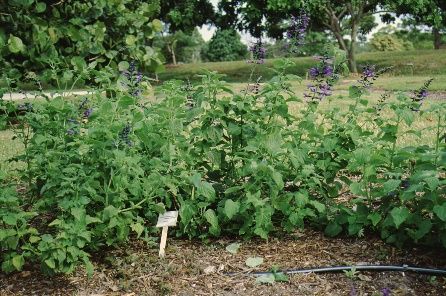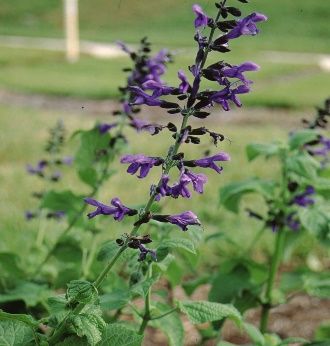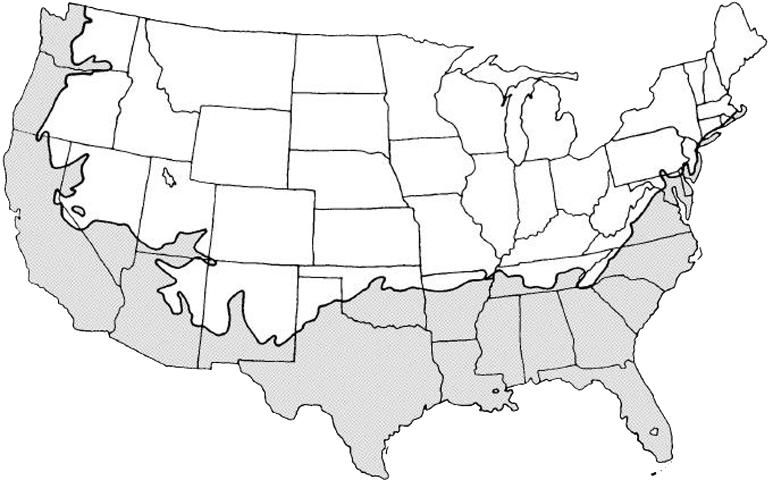Introduction
'Purple Majesty' is an herbaceous perennial that bears striking, deep purple flowers. This 3 foot tall, upright plant has dark green foliage that adds a fine texture to the garden. Its rich flowers appear throughout the spring, summer, and fall seasons.

Credit: Edward F. Gilman, UF/IFAS

Credit: Edward F. Gilman, UF/IFAS
General Information
Scientific name: Salvia guarantica x gesneraeflora 'Purple Majesty'
Pronunciation: SAL-vee-uh gar-RAN-tick-kuh
Common name(s): 'Purple Majesty' sage, 'Purple Majesty' salvia
Family: Labiatae
Plant type: perennial; herbaceous
USDA hardiness zones: 7 through 11 (Figure 3)
Planting month for zone 7: Jun; Jul
Planting month for zone 8: May; Jun; Jul
Planting month for zone 9: Apr; May; Jun; Jul; Aug; Sep
Planting month for zone 10 and 11: Feb; Mar; Apr; May; Jun; Jul; Aug; Sep; Oct; Nov; Dec
Origin: not native to North America
Invasive potential: not known to be invasive
Uses: cut flowers; border; edging; mass planting; attracts butterflies; attracts hummingbirds; hanging basket; cascading down a wall
Availability: somewhat available, may have to go out of the region to find the plant

Credit:
Description
Height: 1 to 2 feet
Spread: 2 to 3 feet
Plant habit: round
Plant density: moderate
Growth rate: moderate
Texture: fine
Foliage
Leaf arrangement: opposite/subopposite
Leaf type: simple
Leaf margin: dentate
Leaf shape: saggitate (arrow)
Leaf venation: pinnate; reticulate
Leaf type and persistence: semi-evergreen
Leaf blade length: 2 to 4 inches
Leaf color: green
Fall color: not applicable
Fall characteristic: not applicable
Flower
Flower color: purple
Flower characteristic: spring flowering; summer flowering; fall flowering; flower season is longer in zones 9-11
Fruit
Fruit shape: unknown
Fruit length: unknown
Fruit cover: unknown
Fruit color: unknown
Fruit characteristic: inconspicuous and not showy
Trunk and Branches
Trunk/bark/branches: typically multi-trunked or clumping stems
Current year stem/twig color: green
Current year stem/twig thickness: thick
Culture
Light requirement: plant grows in full sun
Soil tolerances: acidic; alkaline; sand; loam; clay
Drought tolerance: moderate
Soil salt tolerances: unknown
Plant spacing: 18 to 24 inches
Other
Roots: not applicable
Winter interest: no special winter interest
Outstanding plant: not particularly outstanding
Pest resistance: no serious pests are normally seen on the plant
Use and Management
Sage may be used as a specimen in a small garden but is most attractive in mass plantings in most residential and commercial landscapes. Space plants about 15 inches apart to establish a quick cover.
Place sage in an area of the landscape where it can receive full sun to partial shade. It favors well-drained soils and is quite drought tolerant. Both the tops and roots are generally unscathed by freezing temperatures in all but the coldest parts of Florida. Freezing temperatures kill the plant in the northern part of its range.
Pests and Diseases
No pests or diseases are of major concern other than chewing insects.